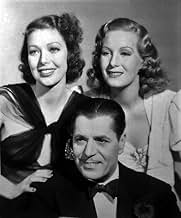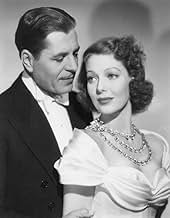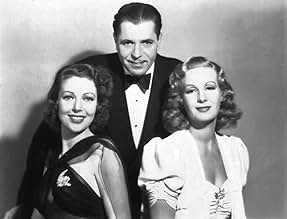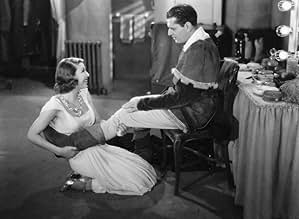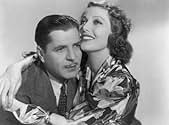IMDb RATING
6.2/10
260
YOUR RATING
Woman hopes to be a great singer and is encouraged by her scheming teacher. After she flops, her husband - encouraged by an amorous professional singer - tries opera and also flops.Woman hopes to be a great singer and is encouraged by her scheming teacher. After she flops, her husband - encouraged by an amorous professional singer - tries opera and also flops.Woman hopes to be a great singer and is encouraged by her scheming teacher. After she flops, her husband - encouraged by an amorous professional singer - tries opera and also flops.
- Director
- Writers
- Stars
- Awards
- 3 wins total
- Director
- Writers
- All cast & crew
- Production, box office & more at IMDbPro
Featured reviews
I caught about 3/4 of this movie last night on Turner Classics and I wish I had seen it from the beginning. I was so taken with Warner Baxter's performance - he is so cute when he performs on stage the first time, scratching and looking uncomfortable. Later when he reluctantly stars with Miss Barnes in an opera, dressed in this Renaissance type outfit complete with fake beard, he is just a delight to watch. I actually laughed out loud. The dialog is crisp and funny, Loretta Young is very appealing and the supporting actors are real characters. I would buy this movie and skip the music, except for the last song they do on the train.
The title characters of Wife, Husband, and Friend are Loretta Young, Warner Baxter and Binnie Barnes. Although given Binnie's actions in the film the characterization is open to interpretation.
Loretta and Warner are the proverbial happily married upper middle class couple, he in the contracting business and she the socialite with a dream of being a concert singer. Seems to be a hereditary thing, Loretta's mother Helen Westley had similar ambitions to the chagrin of her father George Barbier.
Baxter tries to humor her, but that only encourages and his humoring becomes an expensive proposition. Enter real opera singer Binnie Barnes who accidentally discovers its Baxter who's got the voice in the family. Baxter also attracts her in other ways. In the meantime Loretta's got Cesar Romero, a pianist buzzing around her hive.
I'd love to know who dubbed the voices of all these people, the film from 20th Century Fox lists no credits. The major fault in the film is the casting of Baxter. He's a good actor, but hardly a blue collar type. When the film was remade ten years later, Paul Douglas played Baxter's role in Everybody Does It.
Even with Baxter miscast, the film's got a lot of amusing moments, especially on the opera stage with Baxter. He carries the comedy part off real well. Unlike A Night At The Opera where the Marx Brothers set out to disrupt the opera, Baxter does his whole shtick quite accidentally.
I'm glad TCM unearthed this long buried classic, it's dated, but still has some good moments. Loretta beauty sparkles and Binnie Barnes was never better as the wisecracking other woman.
Loretta and Warner are the proverbial happily married upper middle class couple, he in the contracting business and she the socialite with a dream of being a concert singer. Seems to be a hereditary thing, Loretta's mother Helen Westley had similar ambitions to the chagrin of her father George Barbier.
Baxter tries to humor her, but that only encourages and his humoring becomes an expensive proposition. Enter real opera singer Binnie Barnes who accidentally discovers its Baxter who's got the voice in the family. Baxter also attracts her in other ways. In the meantime Loretta's got Cesar Romero, a pianist buzzing around her hive.
I'd love to know who dubbed the voices of all these people, the film from 20th Century Fox lists no credits. The major fault in the film is the casting of Baxter. He's a good actor, but hardly a blue collar type. When the film was remade ten years later, Paul Douglas played Baxter's role in Everybody Does It.
Even with Baxter miscast, the film's got a lot of amusing moments, especially on the opera stage with Baxter. He carries the comedy part off real well. Unlike A Night At The Opera where the Marx Brothers set out to disrupt the opera, Baxter does his whole shtick quite accidentally.
I'm glad TCM unearthed this long buried classic, it's dated, but still has some good moments. Loretta beauty sparkles and Binnie Barnes was never better as the wisecracking other woman.
This is a forgettable movie about a wife who dreams of being an opera singer, though she hasn't got the talent, and her husband, who when he discovers that he does have a great voice starts to dream of a career as a singer as well. The collapse of his career results from a performance of an opera called Arlesiana. I figured it would be Cilea's work, but in fact it is evidently like the Salammbo in Citizen Kane: a work written for the movie. It's sung in Italian, but the music is definitely not Cilea's, and the sets and costumes suggest some Renaissance tale rather than Daudet's simple farmers in late nineteenth-century southern France.
There's really nothing to recommend this movie.
There's really nothing to recommend this movie.
This rarely shown 1939 Twentieth-Century-Fox comedy is based on a frothy novel by James M. Cain, best known today for his hard-boiled detective fiction and screenplays. With a first-rate script by one of Zanuck's most versatile collaborators --the writer/producer/director Nunnally Johnson, who the very next year would be nominated for his screenplay for "Grapes of Wrath," the movie is blessed with an unusual cast: Warner Baxter, whom one would never think of as a comic actor, is perfectly believable and extremely appealing as the too understanding husband; the incandescently lovely and, for once, the not-too-saccharine Loretta Young as his not quite talented enough wife; Binnie Barnes as the scheming other woman; Helen Westley as the dreadful mother-in-law, and finally one of Lubitsch's stalwarts, George Barbier, as Westley's long-suffering husband. Perhaps in tribute to the great maestro himself the film ends with Baxter and Young in a train singing "Beyond the Blue Horizon" which Jeanette MacDonald also sang in a train in Lubitsch's classic "Monte Carlo." Gregory Ratoff directs with great flair.
Wife, Husband and Friend (1939)
*** (out of 4)
This is a rather bizarre comedy from Fox, which has Loretta Young playing the wife, a woman who thinks she has a great voice and would make a terrific star but she doesn't realize that she's rather mediocre. Warner Baxter is the husband who hates music until one day he realizes that he's got a great voice and goes out on tour behind the wife's back. The friend (Binnie Barnes) brings on all sorts of problems with her greed and jealousy. WIFE, HUSBAND AND FRIEND is a good movie thanks in large part to a terrific cast but I honestly can't remember a comedy from this era that had more unlikeable characters. In fact, I'd say all of the characters here were quite ugly all around leading with the wife. She's so self-centered, rude and spoiled that you can't help but not like her and especially after a breakdown scene she has towards the end. Baxter's character really isn't much better and there's no question that the Barnes diva is annoying and a real jerk. The shocking thing is that all three actors are simply wonderful with their performances and especially Young during that breakdown scene I mentioned. Baxter really gets to shine with some of the comedy early on and we get strong work from Cesar Romero, George Barbier and Eugene Palette. The film isn't as funny as one would have liked but there are enough laughs to keep it going and there's no question that the cast is in fine form.
*** (out of 4)
This is a rather bizarre comedy from Fox, which has Loretta Young playing the wife, a woman who thinks she has a great voice and would make a terrific star but she doesn't realize that she's rather mediocre. Warner Baxter is the husband who hates music until one day he realizes that he's got a great voice and goes out on tour behind the wife's back. The friend (Binnie Barnes) brings on all sorts of problems with her greed and jealousy. WIFE, HUSBAND AND FRIEND is a good movie thanks in large part to a terrific cast but I honestly can't remember a comedy from this era that had more unlikeable characters. In fact, I'd say all of the characters here were quite ugly all around leading with the wife. She's so self-centered, rude and spoiled that you can't help but not like her and especially after a breakdown scene she has towards the end. Baxter's character really isn't much better and there's no question that the Barnes diva is annoying and a real jerk. The shocking thing is that all three actors are simply wonderful with their performances and especially Young during that breakdown scene I mentioned. Baxter really gets to shine with some of the comedy early on and we get strong work from Cesar Romero, George Barbier and Eugene Palette. The film isn't as funny as one would have liked but there are enough laughs to keep it going and there's no question that the cast is in fine form.
Did you know
- TriviaJames M. Cain, whose story "Two Can Sing" was the basis for this film, had himself trained as an operatic baritone. Opera figures prominently in several of his other stories, including "Serenade" and "Mildred Pierce" (though the opera parts of the plot of "Mildred Pierce" were dropped in the film version).
- Quotes
Leonard Borland aka Logan Bennett: You're just an old... Foof! Sorry, ladies.
- ConnectionsReferenced in Biography: Cesar Romero: In a Class by Himself (2000)
Details
- Release date
- Country of origin
- Language
- Also known as
- Wife, Husband and Friend
- Filming locations
- Production company
- See more company credits at IMDbPro
- Runtime1 hour 20 minutes
- Color
- Aspect ratio
- 1.37 : 1
Contribute to this page
Suggest an edit or add missing content


